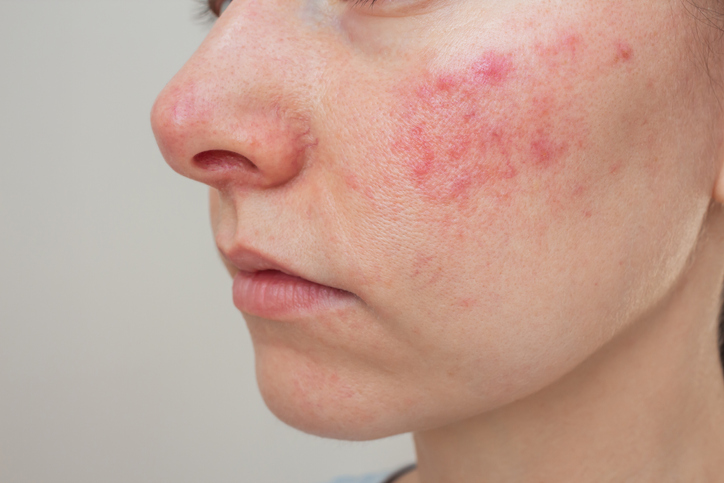
What is the difference between eczema, dermatitis and psoriasis?
Worried you have eczema, dermatitis, or psoriasis? We talk symptoms, causes, triggers, and treatments for these common causes of itchy skin.
Dr Michael Rich is a specialist dermatologist who has been performing tumescent liposuction for over 30 years. Find out if Liposuction is suitable for you at ENRICH Clinic.
At ENRICH Clinic, we have a wide range of dermatological and cosmetic body treatments tailored to individual body and patient needs.
At ENRICH Clinic, our treatments are performed by our medical team consisting of doctors, nurses, and dermatologists and are tailored to each patient’s skin health needs.
ENRICH Clinic is committed to your skin health and well-being with a range of dermatological & cosmetic treatments tailored to the individual. Our treatments are performed by our medical team consisting of doctors, nurses, and dermatologists.
Skin health is essential for everyone. ENRICH Clinic has a wide range of technologies and dermatological solutions to help you achieve your skin care goals.
Skin conditions are a common problem that many people experience throughout their lifetime. Dermatitis and psoriasis are the two most commonly seen skin conditions, but they are often mistaken for one another due to their overlapping symptoms.
While dermatitis is primarily an inflammation of the skin, psoriasis is an autoimmune condition that causes inflamed, red patches of thick skin. Below are the differences between these two conditions in more detail and provide an overview of other related skin ailments.
Dermatitis is a broad term to describe several types of skin inflammation. It can cause dryness, redness, itching and scaling on the surface of our skin. It is typically characterised by itching, redness, scaling and/or skin cracking. The most common types include
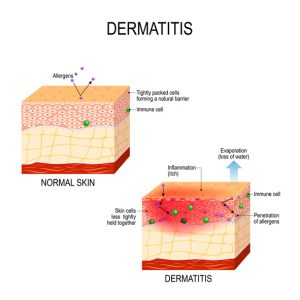
It is important to note that some people may have more than one type of dermatitis and that the condition can change over time. Our dermatologists can help diagnose and identify the type of dermatitis you have and develop an appropriate treatment plan.
The exact cause of dermatitis is unknown but is thought to be triggered by an underlying condition or factors like allergies, irritants, genetics and stress. Allergens that trigger dermatitis vary greatly from person to person, but common ones include dust mites, mould spores, animal dander and certain foods.
Irritants like harsh soaps and detergents may also trigger an outbreak or worsen existing symptoms if you have sensitive skin.
Stress can also play a role in developing or worsening existing cases of dermatitis as it weakens our body’s natural ability to fight off infection, which can lead to flare-ups.
Treatment for dermatitis typically aims to reduce inflammation, relieve itching and prevent secondary skin infections. The specific treatment plan will depend on the type of dermatitis you have and the severity of the condition. Some common treatment options include
Dermatitis and psoriasis are both associated with skin conditions that cause significant discomfort, itching, and inflammation.
Dermatitis is an umbrella term used to describe a wide range of skin conditions involving inflammation. Psoriasis is a type of dermatitis with similar symptoms but is more persistent and challenging to treat than other forms of dermatitis. It appears as thicker silver-coloured patches with red borders around them on the outside of the body such as the elbows or knees.
Both psoriasis and dermatitis can be triggered by external factors such as stress and allergens, but psoriasis is generally considered more serious due to its deeper-rooted causes and its ability to spread over large areas of skin on the body.
Plaque psoriasis. This is the most common form of psoriasis, characterised by raised, red patches of skin covered with a silver or white buildup of dead skin cells. If you have plaque psoriasis, you can find the patches–called plaques–on your elbows, knees, scalp, or lower back.
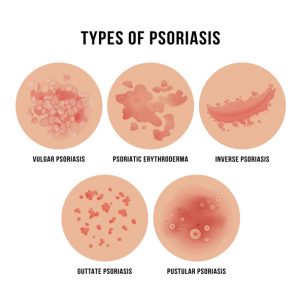
Guttate psoriasis. Small, red, drop-like lesions characterise this type of psoriasis on the skin. It often develops suddenly, typically following a streptococcal infection, and is more common in children and young adults.
Inverse psoriasis. This type of psoriasis causes smooth, red patches in the folds of the skin, such as the armpits, groin, and under the breasts. It is often aggravated by friction and sweating.
Pustular psoriasis. This type of psoriasis is characterised by raised, red, scaly skin patches filled with pus. It can be localised to one area of the body or can be widespread.
Erythrodermic psoriasis. This is a rare and severe form of psoriasis that causes widespread redness and scaling of the skin. It can be accompanied by severe itching and pain and can also cause fever and chills.
Treatment for psoriasis is typically aimed at reducing inflammation and slowing the growth of skin cells. The specific treatment plan will depend on the type of psoriasis you have and the severity of the condition. Some common treatment options include
Both dermatitis and psoriasis can significantly impact your quality of life. While self-care measures such as keeping skin moisturised, avoiding scratching and avoiding triggers can help manage your symptoms, remember that early detection and treatment of these conditions can help prevent complications and improve the outcome.
Talk to our skin specialists if you suspect you have any of these conditions or any concerns regarding your skin.
*With all surgeries or procedures, there are risks. Consult your physician (GP) before undertaking any surgical or cosmetic procedure. Please read the consent forms carefully and be informed about every aspect of your treatment. Surgeries such as liposuction have a mandatory seven-day cooling-off period to give patients adequate time to be sure of their surgery choice. Results may also vary from person to person due to many factors, including the individual’s genetics, diet and exercise. Before and after photos are only relevant to the patient in the photo and do not necessarily reflect the results other patients may experience. Ask questions. Our team of dermatologists, doctors and nurses are here to help you with any of your queries. This page is not advice and is intended to be informational only. We endeavour to keep all our information up to date; however, this site is intended as a guide and not a definitive information portal or in any way constitutes medical advice.
"*" indicates required fields
Combining Dr Rich’s dermatological skill with his knowledge of restorative skin regimes and treatments, the ENRICH range is formulated to help maintain and complement your skin. Our signature Vitamin C Day & Night creams are now joined by a Vit A, B,&C Serum and a B5 Hyaluronic Gel, both with hydration properties and much, much more.

Worried you have eczema, dermatitis, or psoriasis? We talk symptoms, causes, triggers, and treatments for these common causes of itchy skin.
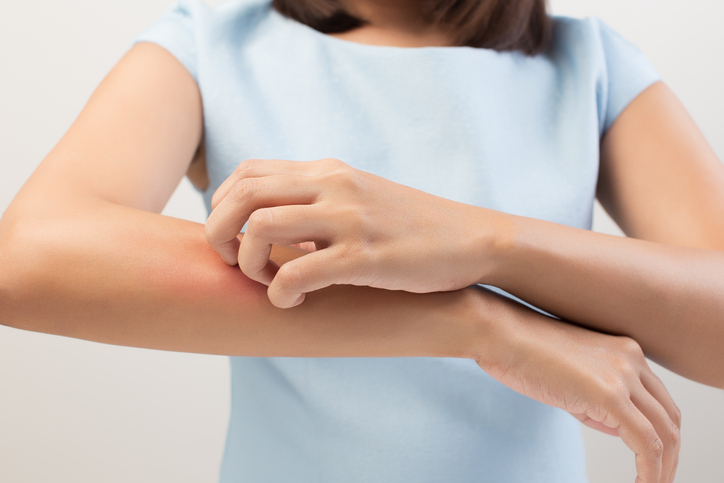
Suddenly dealing with itchy skin? We’ll talk about the common causes and how to find relief.
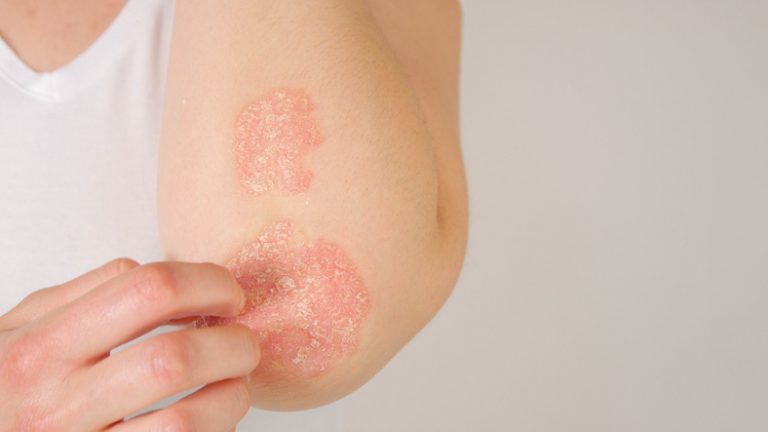
It is a common disease with no cure and can interfere with daily life. It can also be very painful. The good news, though, is there are treatments and lifestyle choices that can help you manage psoriasis.
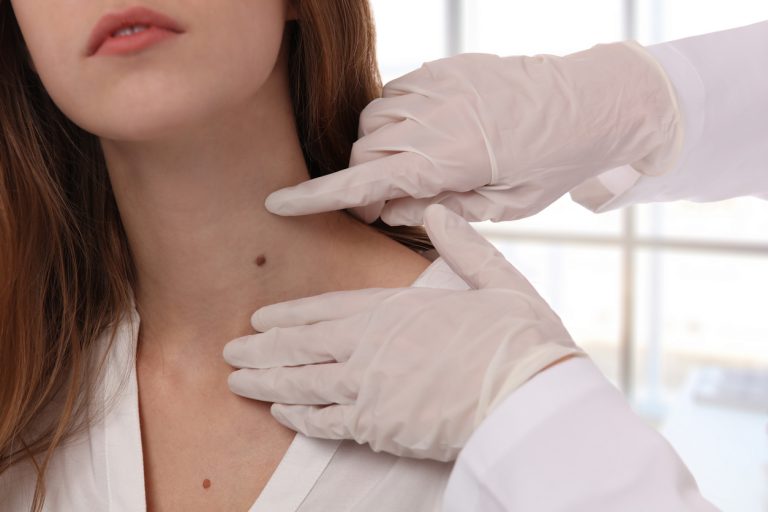
You’d be amazed at what a dermatologist treats, especially us – we’re cosmetic dermatologists too, so we have all your skin needs covered.
Subscribe to the ENRICH newsletter and receive latest news & updates from our team.
Enrich Clinic acknowledges the Traditional Lands of the Wurundjeri Woi Wurrung and Bunurong peoples of the East Kulin Nations on which we work and trade. We pay respect to their Elders past, present and emerging. We extend our acknowledgement and respect to the LGBTQIA+ community who we welcome and support. Read our full Acknowledgement Statement here
